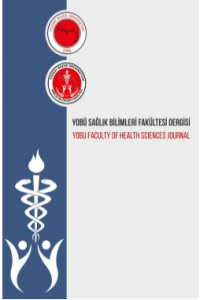TRAVAYDA GEBELERE UYGULANAN HİDROTERAPİNİN DOĞUM ENDİŞESİ VE KONFOR DÜZEYİNE ETKİSİ: RANDOMİZE KONTROLLÜ BİR ÇALIŞMA
Amaç: Bu çalışma travayda gebelere uygulanan hidroterapinin doğum endişesi ve konfor düzeyine etkisini değerlendirmek
amacıyla yürütüldü.
Yöntem: Bu çalışma randomize kontrollü olarak 40 deney ve 40 kontrol grubunda olmak üzere toplam 80 gebe ile tamamlandı.
Araştırmaya katılmaya gönüllü, Türkçe konuşup anlayabilen ve okur yazar olan, kronik hastalığı ve gebeliğe bağlı
komplikasyonu bulunmayan, 18-45 yaş arası ve servikal dilatasyonu 0-3 cm olan gebeler dahil edildi. Veriler tanıtıcı bilgi
formu, Doğum Konforu Ölçeği (DKÖ), Oxford Doğum Endişesi Ölçeği (ODEÖ) ve Öznel Rahatsızlık Birimi Ölçeği ile
toplandı. Deney grubundaki gebelere araştırmacı tarafından travay odasında bulunan banyoda 37 °C sıcaklıkta doğumun her 3
fazında (aktif, latent, geçiş) ortalama 20-25 dk süren bir defa duş aldırıldı.
Bulgular: Çalışmada kontrol grubundaki gebelerin yaş ortalamasının 27.66±3.84 iken, deney grubunda 26.76±3.04 olduğu
belirlendi (p>0.05). Deney ve kontrol grubundaki gebelerin DKÖ puanlarının son testteki karşılaştırılmasına bakıldığında;
fiziksel konfor, psiko-spiritüel konfor ve DKÖ toplam puanlar açısından istatistiksel olarak anlamlı fark olduğu saptandı
(p<0.05). İstatistiksel açıdan gruplar arasında doğum öncesi belirsizlik alt boyutu ve ODEÖ toplam ölçek puanında anlamlı
fark tespit edildi (p<0.05).
Sonuç: Bu çalışmada, gebelerin tamamına yakınının doğuma yönelik endişesinin olduğu belirlendi. Hidroterapinin doğumun
aktif ve geçiş fazlarında hissedilen ağrının azaltılmasında, doğum konforunu artırmada ve doğum endişesini azaltmada etkili
olduğu saptandı. Ayrıca doğumda fiziksel ve genel konfor ile endişe düzeyinin orta düzeyli ilişkili olduğu belirlendi.
THE EFFECT OF HYDROTHERAPY ON BIRTH COMFORT LEVEL AND WORRY ABOUT BIRTH IN LABOUR: A RANDOMIZED CONTROLLED STUDY
Aim: This study was carried out to evaluate the effect of hydrotherapy applied to pregnant women in labor on birth anxiety and comfort level.Method: This study was completed with a total of 80 pregnant women, 40 of whom were in the randomized controlled type and 40 in the control group. Pregnant women who were willing to participate in the study, who could speak and understand Turkish, were literate, had no chronic disease and pregnancy-related complications, were between the ages of 18-45 and had a cervical dilatation of 0-3 cm were included. Data were collected using a sociodemographic information form, Birth Comfort Scale (BCS), The Oxford Worries About Labour Scale (OWLS) and Subjective Unit of Discomfort Scale. The pregnant women in the experimental group were given a shower by the researcher in the bathroom in the labor room, at 37 °C, for each of the 3 phases of labor (active, latent, transitional) for an average of 20-25 minutes.Results: In the study, it was determined that the mean age of the pregnants in the control group was 27.66±3.84, while it was 26.76±3.04 in the experimental group (p>0.05). Statistically significant difference was found in terms of physical comfort, psycho-spiritual comfort and BCS total scores (p<0.05). There was a significant difference between the groups in the prenatal uncertainty sub-dimension and the total scale score of OWLS (p<0.05). Conclusions: In this study, it was determined that almost all of the pregnant women had anxiety about childbirth. Hydrotherapy was found to be effective in reducing pain felt in the active and transitional phases of labor, increasing birth comfort and reducing birth anxiety. In addition, it was determined that physical and general comfort at birth and anxiety level were moderately related.
___
Referans 1 Koelewijn JM, Sluijs AM, Vrijkotte TG. Possible relationship between general and pregnancy-related anxiety during the first half of pregnancy and the birth process: a prospective cohort study. BMJ Open 2017; 7(5):e013413.
